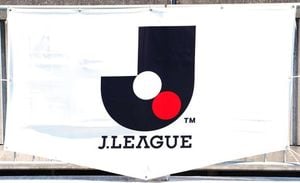As the political landscape in France heats up ahead of the 2027 presidential election, a recent Ifop poll for the Hexagones Institute reveals that the far-right party Rassemblement National (RN) continues to dominate. The poll, conducted among over 10,000 respondents, suggests that whether led by Marine Le Pen or Jordan Bardella, the RN is projected to secure between 32% and 35% of the vote in the first round, positioning itself as the clear frontrunner.
Despite recent legal challenges facing Le Pen, including a five-year ineligibility ruling for misuse of public funds, the RN remains resilient. Bardella, who has positioned himself as a potential successor to Le Pen, stated on April 26 that he would be ready to step in if Le Pen is unable to run. The poll results indicate that both candidates would likely lead the first round, with a significant margin over their competitors.
In a hypothetical second-round matchup, the results become more complex. While Le Pen is projected to lose against former Prime Minister Edouard Philippe—receiving 48% of the vote compared to Philippe's 52%—Bardella would be neck and neck with Philippe, with both candidates potentially receiving 50% of the vote each. This tight race highlights the shifting dynamics within French politics as the RN seeks to cement its influence.
Edouard Philippe, who is seen as the leading candidate from the central bloc, is credited with 22% of voting intentions, significantly ahead of Gabriel Attal from the Renaissance party, who garners only 14%. Philippe's ability to unite the center could prove crucial in the upcoming election, especially as the left remains divided.
The left, represented by figures such as Jean-Luc Mélenchon and Raphaël Glucksmann, appears to be struggling in the poll. Glucksmann narrowly leads Mélenchon with 15% to 13% in scenarios where both are the only candidates from the left. This division among left-leaning candidates could hinder their chances of advancing to the second round, as the poll suggests they would be unable to unify effectively.
On the right, the competition remains fierce, with Bruno Retailleau and Laurent Wauquiez vying for the Republican nomination. Retailleau is projected to perform better in the polls, achieving between 7.5% and 10% of the vote, depending on the candidates present. However, neither is expected to surpass the leading candidates from the RN or the central bloc.
Interestingly, up to 28% of respondents in the poll indicated that they had no intention of voting in the potential second-round matchups, highlighting a significant level of uncertainty among the electorate. This volatility could play a crucial role as the election date approaches.
The survey, which provides insights into voter intentions and preferences, was conducted from April 11 to 30, 2025, and is considered a snapshot of the current political climate rather than a definitive prediction of the election outcome.
As the candidates prepare for the upcoming election, the RN's strong position and the potential for a close race between Philippe and either Bardella or Le Pen suggest that the 2027 presidential election will be one of the most closely watched contests in recent French history. With the political landscape constantly evolving, both voters and candidates will need to navigate the complexities of a divided electorate and shifting allegiances.






